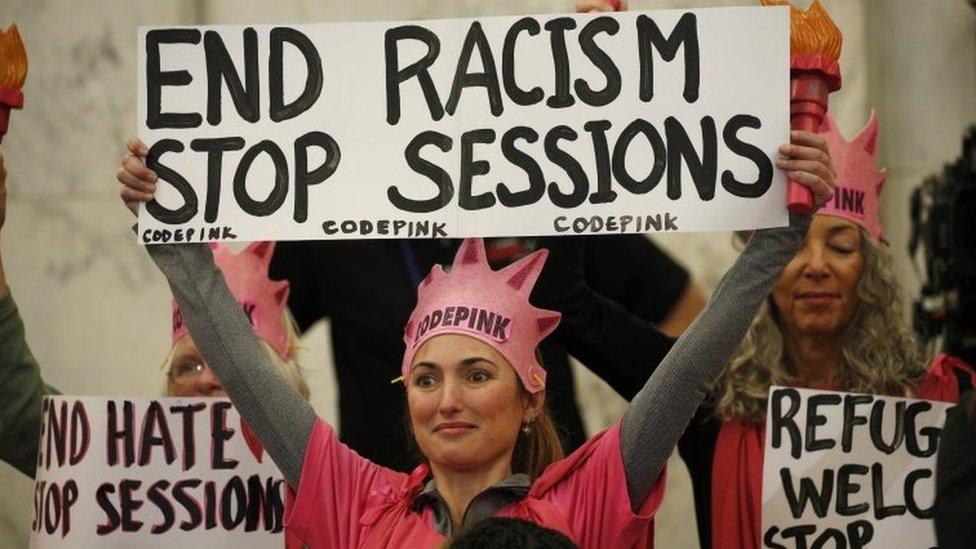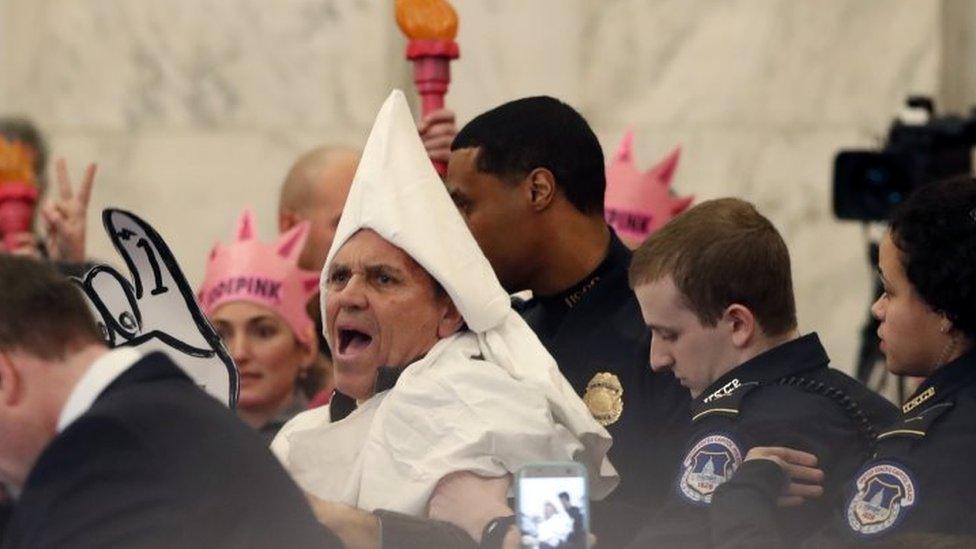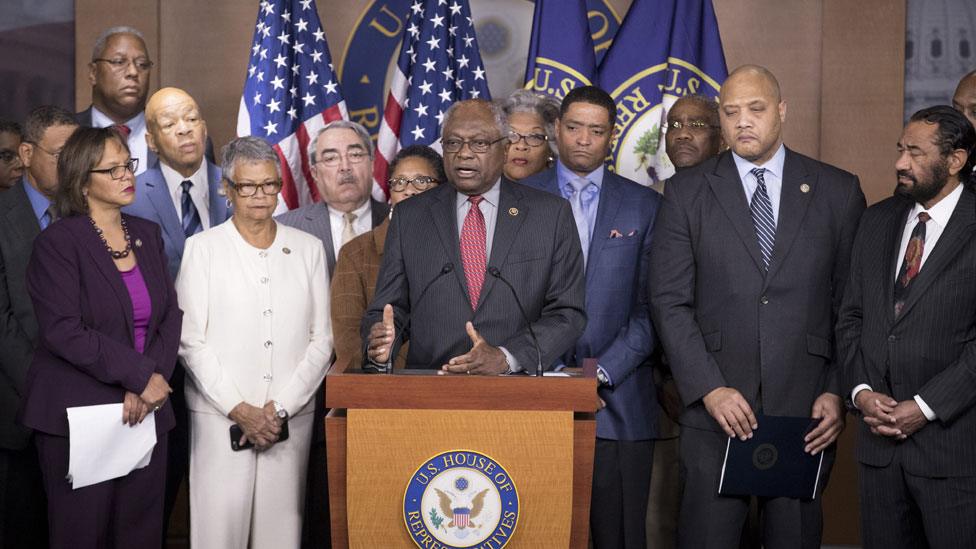Jeff Sessions, US attorney general nominee, denies KKK sympathies
- Published
Jeff Sessions said caricature of him as a 'Southern racist was painful'
President-elect Donald Trump's pick to be the new attorney general has denied sympathising with the Ku Klux Klan, in a tough Senate confirmation hearing.
Alabama Senator Jeff Sessions, 69, also pledged to recuse himself from any investigation into former Democratic presidential candidate Hillary Clinton.
A Democratic senator expressed "deep concern" about the Alabama Republican's nomination.
But Democrats do not have the power in the chamber to block his confirmation.
The attorney general, America's top prosecutor, leads the US justice department and acts as the main adviser to the president on legal issues.
Beginning two days of hearings before the Senate Judiciary Committee, Mr Sessions, 69, testified that allegations he had once supported the KKK were "damnably false".
"I abhor the Klan and what it represents and its hateful ideology," he added.
Mr Sessions also acknowledged "the horrendous impact that relentless and systemic discrimination and the denial of voting rights has had on our African-American brothers and sisters".

Members of the women's rights activist group Code Pink sit in on Mr Sessions' hearing
Protesters repeatedly disrupted Tuesday's hearing, including a couple dressed in KKK white robes who chanted: "No Trump, No KKK, No Racist USA."
"Stop this racist pig from getting into power," shouted an African-American demonstrator as she was led out of the hearing by police.
Democratic Senator Dianne Feinstein voiced her concern over "fear in this country, particularly among the African-American community".
She noted Mr Sessions had voted against an amendment affirming that the US would not bar people entering the US on the basis of their religion.
But Mr Sessions said he did not support the "idea that Muslims as a religious group should be denied admission to the United States. We have great Muslim citizens."
Republican Senator Chuck Grassley described the nominee as a "man of honour and integrity".

No knock-out blows - Anthony Zurcher, BBC North America reporter
If Democrats hoped for a revelation that would block Jeff Sessions' path to confirmation as Donald Trump's attorney general, Tuesday's congressional hearings had to be a disappointment.
Although the question-and-answer exchanges with Republican and Democratic senators were wide-ranging, the Alabama politician steered well clear of any possible conflagrations.
It became clear early on that the Republican participants would serve as guides for Mr Sessions, inoculating him against anticipated lines of attack. South Carolina's Lindsey Graham asked about charges of past racism. Iowa's Chuck Grassley prompted a promise of recusal from any future Justice Department investigations into Hillary Clinton.
Democrats, on the other hand, focused their sharpest questioning on Mr Sessions' votes as a senator, including his opposition to abortion legalisation and portions of the Violence Against Women Act and hate-crime legislation.
They seemed less interested in accusations of racism that sunk the Alabaman's 1986 judicial nomination.
Tomorrow may be a different story, however, as a panel of Sessions critics - including Senator Cory Booker and Congressman Jim Clyburn, a civil rights activist - takes centre stage.
If today is any indication, however, Mr Sessions' Republican support is holding fast, which means he's well on his way to confirmation.


Protesters dressed in Ku Klux Klan robes were escorted from the hearing
Democratic Senator Patrick Leahy quizzed Mr Sessions about obscene comments Mr Trump made about women in a 2005 videotape.
Mr Trump had said "you can do anything" to women "when you're a star" and bragged about trying to grope and kiss them.
Mr Leahy asked Mr Sessions: "Is grabbing a woman by her genitals without her consent sexual assault?"
Mr Sessions replied: "Clearly it is."
Waterboarding 'improper and illegal'
Mr Sessions also promised to remove himself from any investigation into Mrs Clinton, as well as her family's charitable foundation.
He said his past criticism of her private emails and the Clinton Foundation "could place my objectivity in question".
"We can never have a political dispute turn into a criminal dispute," Mr Sessions told the committee.
When asked whether he ever chanted the anti-Clinton slogan "lock her up", the senator said: "No I did not... I don't think."
A Democratic critic says there's no evidence Sessions will be 'fair and humane' on immigration
Mr Trump had pledged on the campaign trail to appoint a special prosecutor to investigate Mrs Clinton, but he has since retracted that threat.
In other testimony:
The pro-life social conservative recognised that same-sex marriage and the legal right to abortion were the law of the land
He accepted waterboarding was "improper and illegal", but said Guantanamo Bay fits the purpose of keeping prisoners "marvellously well"
Mr Sessions reaffirmed his staunch opposition to amnesty, the granting of legal status to people who have entered the US illegally
He said he "has no reason to doubt" US intelligence findings that linked Vladimir Putin to the hacking of Democratic party emails
With 20 years under his belt in the Senate, Mr Sessions is known as one of the most conservative members of the upper chamber.
He was denied a federal judgeship in 1986 after the Senate Judiciary Committee heard testimony that he made racist remarks.
Mr Sessions was also accused of calling a black assistant US attorney "boy" and telling him to be careful about how he spoke to "white folks". He denied saying it.
But Republicans who have known him a long time deny Mr Sessions is a racist.
Some have pointed out he supported the award of a Congressional Gold Medal to civil rights heroine Rosa Parks.

The Congressional Black Caucus has voiced its concern about Sessions